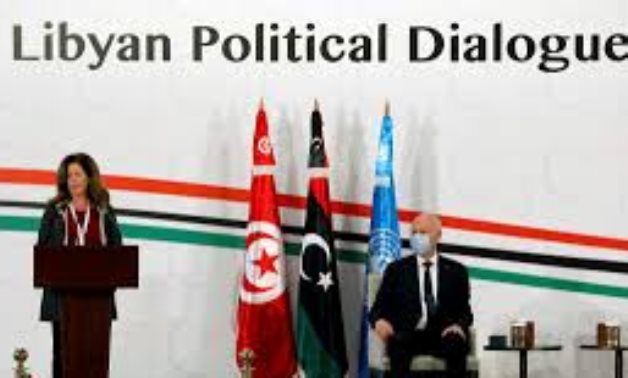
Acting Special Representative of the Secretary-General Stephanie Williams hosts the fourth round of the 5+5 Libyan Joint Military Commission, Palais des Nations. 19 October 2020.
CAIRO-3 January 2020: Acting Special Representative of the Secretary-General of the United Nations for Libya (ASRSG), Stephanie Williams announced, on Sunday, the formation of an advisory committee emanating from the Libyan Political Dialogue Forum, where the United Nations Support Mission in Libya received a file containing 28 nominations.
In a statement, the UN mission praised the enthusiasm shown by the forum members in the nomination and recommendation process, in line with the principle of inclusiveness, which is the core of the principles of the Libyan Political Dialogue Forum. It decided to expand the advisory committee to 18 members to ensure a wide geographical and political diversity, in addition to ensuring the participation of women, youth, and cultural components.
The UN mission indicated that the mandate of the advisory committee would be strictly time-bound, as its main task would be to discuss issues related to the selection of a unified executive authority.
The date of the national elections in Libya on December 24, 2021, will remain a constant issue for the United Nations Support Mission in Libya, a principle and a goal that cannot be abandoned.
The committee consists of Mrs. Wafa Saif Al-Nasr, Sultanate of Al-Mesmari, Saida Al-Yaqoubi, Muhammad Al-Ajili Al-Hasnawi, Muhammad Adam Lino, Hussein Al-Ansari, Abdul-Rahman Al-Abbar, Anas Saeed Al-Hamri, Khaled Al-Osta, Musa Faraj, Ali Abdel Aziz, Saeed Saleh Kalla, Abdullah Othman, Dr. Nizar Kawan, Al-Shaibani Abdullah Al-Shaibani, Muhammad Al-Lafi, Ahmad Al-Circassi, Abu Bakr Al-Obaidi.
Meanwhile, Members of the Libyan Dialogue Forum called on the United Nations Security Council to prevent all forms of foreign armed presence and expel mercenaries and foreign bases from Libya.
The members referred to the negative effects of various forms of foreign interference in Libya's affairs, which led to the flow of weapons and mercenaries into the country in violation of international resolutions.
They demanded the formation of a committee to provide the conditions and requirements for comprehensive national reconciliation, as a priority for the new executive authority program, to achieve reconciliation with the rights of the displaced and refuges to ensure their participation in the elections, according to the necessary procedures.
Libya fell into chaos after the assassination of late President Muammar al-Gaddafi amid mass protests against him in 2011 as a civil war has persisted until present. The country’s internationally recognized government is based in Tripoli, while Khalifa Haftar, the commander of the Libyan National Army, is supported by a parallel administration based in the east.
Comments
Leave a Comment